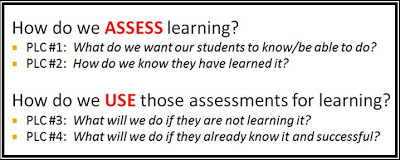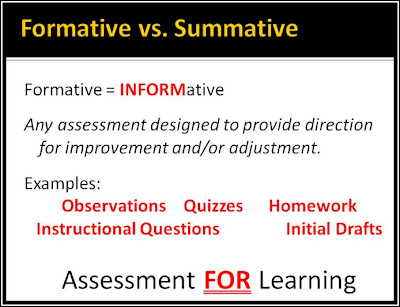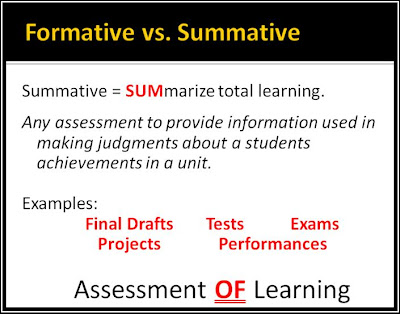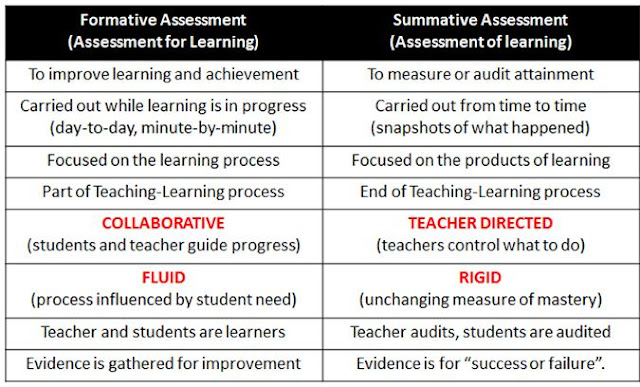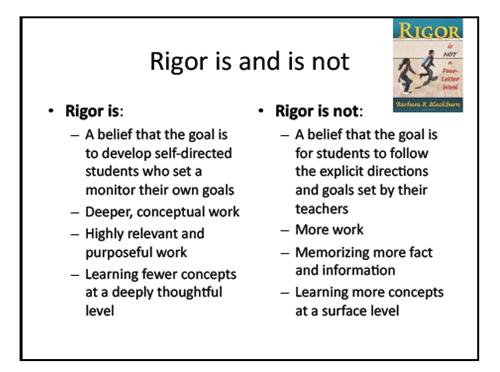Myth 1 - Students will abuse and take advantage of a situation if we treat another student 'differently.' We all believe in differentiating, personalizing, and customizing the educational experience for our students as much as possible. Having said that, many believe that if you do something perceived to be 'easier' for one student or you 'cut them slack,' then other students will exploit and use this situation to their advantage. Here's the deal, what's fair isn't always equal, and what's equal isn't always fair, and a majority of students aren't going to take advantage of a situation just because you treated another student 'differently.'
Myth 2 - Students learn from 'zeros.' When a student receives a zero for not completing an assignment (this could be for numerous different reasons), there's a myth that the student will learn from the zero and learn not to repeat this behavior. For the record, I'm still waiting to find the kid who gets a zero and says 'I have now seen the light and I will no longer commit myself to such atrocities and hence forth all of my future assignments will be turned in completed and on time with a little pretty bow on top...' Zeros teach kids compliance and make grades a weapon rather an instrument for learning.
Myth 3 - Teachers need lots of 'summative' type assessments and excel spreadsheets to determine if a kid has actually mastered the content/skills. Teachers work with their kids on a daily basis and they know their kids really well, both academically and personally. For some kids, they see their teachers more than they do their own parents. It's unprofessional and degrading to educators to think they have to give their students a formalized 'test' just so they can prove what they already know. Save the time, save the aggravation, and focus on continuing to learn...
Myth 4 - More rigor is a good thing. We don't need more rigor in schools... if you've ever seen the definition, then you would probably agree that more rigor is NOT a good thing. How about appropriately challenging our students... that makes more sense to me:
Myth 5 - If a student has an 'A' they've obviously mastered all the content/skills for that particular course. Far too often we get lost in what grades really mean, and unfortunately, we are finding more and more that a grade really isn't very aligned with actual content/skill mastery. Pressure from students, parents, and society, make it difficult to transition away from grades, but the closer and closer we look at grades the further and further away we get from actual definitive proof of learning.
Myth 6 - We have to toughen kids up for the next grade level and/or life experience. How often do we hear a teacher say 'well, in _____ grade this is how they do it.' Or, even better, 'in the real-world you'll have to do _____.' When we say these phrases to kids we are basically saying that their current life and existence pale in comparison to what they will experience next year or later in life. We are also saying that to prepare you for a certain level of misery later in life you need to experience misery now. We don't prepare kids for what's next by making them endure misery now... we teach them and hold them accountable to learning so the next level of misery isn't so miserable.
Myth 7 - When we offer rewards and incentives to get kids to perform at higher levels we are going to get a sustainable and long-lasting positive difference in their effort and overall performance. We live in a society where saying 'what do I get' is far too commonplace. Kids and adults always want to know what's in it for them. This strategy and mindset of using extrinsic motivators and rewards to get better and higher performance is short-term at best. Perhaps you get a boost in performance for a couple weeks, but eventually that 'reward' is going to wear off and the current reward will no longer be enough to warrant that level of performance. True reward is born out of intrinsic motivation and a self-driven interest in doing whatever the task may be. Rewards and incentives are a dangerous game to play and I fear the game has been spinning out of control for a while now...
Myth 8 - Kids need schools to learn. Kids can and are learning all the time. It's time for education to stop assuming that learning can't occur unless it's in a classroom with four walls and a teacher in a school. In fact, we should be embracing and encouraging students to take advantage of the learning that's always around them. The sooner we educators can break down the 'mindset' barrier of when and where learning can occur, the more relevant and applicable formal education will become for our students.
Myth 9 - To be a good and 'tough' teacher, you need to give out tons of homework and do lots of pop quizzes. Parents hate to see their kids at home without any homework because without any homework they assume the students aren't learning anything, thus the teacher must not be teaching anything. This couldn't be further from the truth. Aside from the negative effects of homework and the fact that many students are missing out on what really matters as a young kid growing up, homework is becoming a 'love of learning' killer.
Far too often homework is used to replace a lack of class time and kids are expected to teach themselves and learn on their own. Many kids then struggle and end up doing the work incorrectly anyway. If the kids can already do the work, then homework becomes a simple task of compliance. Lastly, pop quizzes should be avoided. If you trust the validity of your assessments, you shouldn't fear the kid knowing your expectations and knowing the exact time and place of the assessment. Pop quizzes shift the focus away from the content and skills, and put the focus on kids being stressed and pressured... neither of which are good for academic performance.
Myth 10 - School is preparing kids for the real-world. Kids are experiencing the real-world each and every day and believe it or not, school is a part of that real-world. Let's stop treating school and outside of school as two separate entities and acknowledge that the more they become one, the better off our students will be.
 |
| http://goo.gl/Uo2PFN |
Myth 3 - Teachers need lots of 'summative' type assessments and excel spreadsheets to determine if a kid has actually mastered the content/skills. Teachers work with their kids on a daily basis and they know their kids really well, both academically and personally. For some kids, they see their teachers more than they do their own parents. It's unprofessional and degrading to educators to think they have to give their students a formalized 'test' just so they can prove what they already know. Save the time, save the aggravation, and focus on continuing to learn...
Myth 4 - More rigor is a good thing. We don't need more rigor in schools... if you've ever seen the definition, then you would probably agree that more rigor is NOT a good thing. How about appropriately challenging our students... that makes more sense to me:
Myth 5 - If a student has an 'A' they've obviously mastered all the content/skills for that particular course. Far too often we get lost in what grades really mean, and unfortunately, we are finding more and more that a grade really isn't very aligned with actual content/skill mastery. Pressure from students, parents, and society, make it difficult to transition away from grades, but the closer and closer we look at grades the further and further away we get from actual definitive proof of learning.
Myth 6 - We have to toughen kids up for the next grade level and/or life experience. How often do we hear a teacher say 'well, in _____ grade this is how they do it.' Or, even better, 'in the real-world you'll have to do _____.' When we say these phrases to kids we are basically saying that their current life and existence pale in comparison to what they will experience next year or later in life. We are also saying that to prepare you for a certain level of misery later in life you need to experience misery now. We don't prepare kids for what's next by making them endure misery now... we teach them and hold them accountable to learning so the next level of misery isn't so miserable.
Myth 7 - When we offer rewards and incentives to get kids to perform at higher levels we are going to get a sustainable and long-lasting positive difference in their effort and overall performance. We live in a society where saying 'what do I get' is far too commonplace. Kids and adults always want to know what's in it for them. This strategy and mindset of using extrinsic motivators and rewards to get better and higher performance is short-term at best. Perhaps you get a boost in performance for a couple weeks, but eventually that 'reward' is going to wear off and the current reward will no longer be enough to warrant that level of performance. True reward is born out of intrinsic motivation and a self-driven interest in doing whatever the task may be. Rewards and incentives are a dangerous game to play and I fear the game has been spinning out of control for a while now...
Myth 8 - Kids need schools to learn. Kids can and are learning all the time. It's time for education to stop assuming that learning can't occur unless it's in a classroom with four walls and a teacher in a school. In fact, we should be embracing and encouraging students to take advantage of the learning that's always around them. The sooner we educators can break down the 'mindset' barrier of when and where learning can occur, the more relevant and applicable formal education will become for our students.
Myth 9 - To be a good and 'tough' teacher, you need to give out tons of homework and do lots of pop quizzes. Parents hate to see their kids at home without any homework because without any homework they assume the students aren't learning anything, thus the teacher must not be teaching anything. This couldn't be further from the truth. Aside from the negative effects of homework and the fact that many students are missing out on what really matters as a young kid growing up, homework is becoming a 'love of learning' killer.
Far too often homework is used to replace a lack of class time and kids are expected to teach themselves and learn on their own. Many kids then struggle and end up doing the work incorrectly anyway. If the kids can already do the work, then homework becomes a simple task of compliance. Lastly, pop quizzes should be avoided. If you trust the validity of your assessments, you shouldn't fear the kid knowing your expectations and knowing the exact time and place of the assessment. Pop quizzes shift the focus away from the content and skills, and put the focus on kids being stressed and pressured... neither of which are good for academic performance.
Myth 10 - School is preparing kids for the real-world. Kids are experiencing the real-world each and every day and believe it or not, school is a part of that real-world. Let's stop treating school and outside of school as two separate entities and acknowledge that the more they become one, the better off our students will be.





